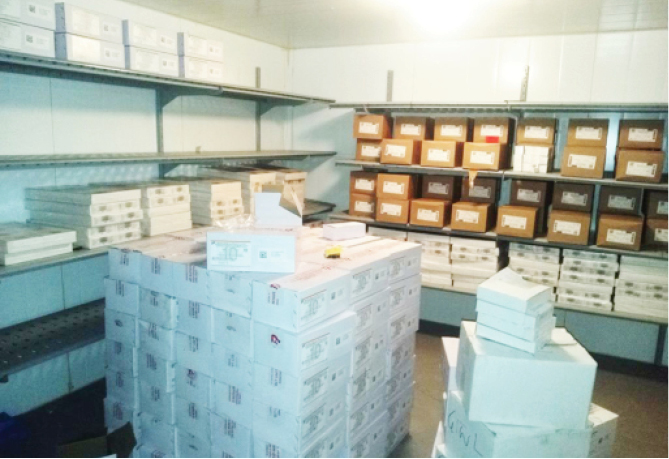By Afolabi Cassandra Adeola
The arrival of the COVID-19 vaccination in Nigeria is a step to curb the incessant spread of the virus in the country. With a coherent plan for distribution and administration the country will be one step away from stopping the spread of the virus and returning to a semblance of normality.
Due to the limited dosage of the COVID-19 vaccine it is important that a coherent plan to effectively and ethically distribute and administer this vaccine in a timely manner is devised.
An effective plan will be free of loopholes where favouritism, corruption and nepotism would not hinder its possible achievements; it will also harness the strength of existing vaccine delivery infrastructure, innovative strategies and include the robust engagement of federal and state health care facilities to ensure effective and equitable access.
In Nigeria, the National Primary Health Care Development Agency (NPHCDA) of the Federal Ministry of Health is charged with reducing morbidity and mortality in the country associated with vaccine-preventable diseases. NPHCDA has prioritised certain category of the population to be immunised first as a result of their risk of exposure. Front line medical personnel, security services and top essential government officials are to be administered the vaccine first. The agency also launched a registration portal for vaccine collection and conducted training for health care workers both on national and state level on the effective handling, storage and administration of COVID-19 vaccines.
Once vaccine has received approval from the National Agency for Food and Drug Administration and Control (NAFDAC) the distribution and administration begins thereafter. Now in order for the vaccine to be accessible to every Nigerian and avoid the politicizing of the available doses there has to be a plan in place – a plan that ensures safety of the products, maintains control and visibility, manages uptake and acceptance, and ensures traceability and maximum coverage.
The critical component to effective vaccine implementation and high immunization coverage includes prioritising population; allocation of vaccine; distribution and administration of second dose.
In prioritising the population, a phased approach should be considered due to the availability of the vaccine. The transmission from one phase to the other will depend on the supply of the vaccine in the country. In the first phase, there are limited doses of the vaccine available which means the category of people to be prioritised are the ones at high risk exposure. Subsequently, older adults, individuals with underlying health conditions and pregnant women should be targeted for vaccination to reduce the number of individuals with severe COVID-19 outcomes. In the third phase, availability of the vaccine will meet demand and the general public will be vaccinated.
States with high numbers of affected persons should be prioritised in order to curb the transmission of the virus. Currently, Lagos State has the most affected persons and should, therefore, be allocated more doses as opposed to states with fewer reported cases.
The NHPCDA will be supporting and securing adequate quantity of ancillary supplies needed for administration, the programme will also make maximum use of all healthcare professionals licensed to administer vaccines.
It is my view that the vaccination programme requires extensive data monitoring infrastructure, including appropriate IT system, to identify when a person needs a second dose, to monitor outcomes and adverse events, and to account for products. Data will need to be available both on the federal and state levels to ensure efficient management of the vaccination programme.
Also identifying the proper messages to promote vaccine confidence and countering misinformation will be necessary to achieve high coverage. Understanding that public confidence in vaccines is necessary for vaccine uptake and acceptance especially in the rural areas. Communication with community leaders to spread the advantages of the vaccine intake will increase public trust in the vaccines and immunisation coverage.
This is an all-encompassing long-term plan for the equitable distribution of the vaccine and its successful implementation will require precise coordination across federal, state and local government levels and also partnership with the private sector.
There are some factors that might inhibit the efficient distribution of the vaccine nationwide. One, the registration of the rural population of the country for collection of the vaccine. The restricted access to internet service or technological know-how to register for the vaccination themselves might pose a problem. Hence, setting up immunisation hubs in rural areas will be a way to remedy this problem. This is important so as not to create a lacuna in the vaccine coverage.
Transportation of vaccines to rural areas might pose a challenge due to the storage requirement of the vaccine. There is need for adequate provision of cold chain storage equipment and a streamlined supply chain to minimize waste of an already limited product.
It is important that the NPHCDA imbibes the nature of transparency and avail the general public with information on the status of the immunisation programme and the vaccine protocol.
Nonetheless, the vaccination programme is likely to last for a long time before substantial coverage is attained depending on the availability of vaccines. So it is important to still maintain all COVID-19 precautions especially in places of worship, market places and schools so as to mitigate the spread of the virus.
Adeola is an intern, Directorate of Research and Policy Analysis Institute for Peace and Conflict Resolution, Abuja

 Join Daily Trust WhatsApp Community For Quick Access To News and Happenings Around You.
Join Daily Trust WhatsApp Community For Quick Access To News and Happenings Around You.


